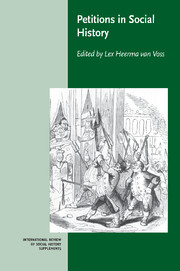Book contents
- Frontmatter
- Contents
- NOTES ON CONTRIBUTORS
- Introduction
- Voices from Among the “Silent Masses”: Humble Petitions and Social Conflicts in Early Modern Central Europe
- Supplications between Politics and Justice: The Northern and Central Italian States in the Early Modern Age
- The Power of Petitions: Women and the New Hampshire Provincial Government, 1695–1700
- Officially Solicited Petitions: The Cahiers de Doléances as a Historical Source
- Revolt, Testimony, Petition: Artisanal Protests in Colonial Andhra
- Deference and Defiance: The Changing Nature of Petitioning in British Naval Dockyards
- Petitions and the Social Context of Political Mobilization in the Revolution of 1848/49: A Microhistorical Actor-Centered Network Analysis
- The Image of Jews in Byelorussia: Petitions as a Source for Popular Consciousness in the Early Twentieth Century
- “Begging the Sages of the Party-State”: Citizenship and Government in Transition in Nationalist China, 1927–1937
- Private Matters: Family and Race and the Post-World-War-II Translation of “American”
The Image of Jews in Byelorussia: Petitions as a Source for Popular Consciousness in the Early Twentieth Century
Published online by Cambridge University Press: 04 August 2010
- Frontmatter
- Contents
- NOTES ON CONTRIBUTORS
- Introduction
- Voices from Among the “Silent Masses”: Humble Petitions and Social Conflicts in Early Modern Central Europe
- Supplications between Politics and Justice: The Northern and Central Italian States in the Early Modern Age
- The Power of Petitions: Women and the New Hampshire Provincial Government, 1695–1700
- Officially Solicited Petitions: The Cahiers de Doléances as a Historical Source
- Revolt, Testimony, Petition: Artisanal Protests in Colonial Andhra
- Deference and Defiance: The Changing Nature of Petitioning in British Naval Dockyards
- Petitions and the Social Context of Political Mobilization in the Revolution of 1848/49: A Microhistorical Actor-Centered Network Analysis
- The Image of Jews in Byelorussia: Petitions as a Source for Popular Consciousness in the Early Twentieth Century
- “Begging the Sages of the Party-State”: Citizenship and Government in Transition in Nationalist China, 1927–1937
- Private Matters: Family and Race and the Post-World-War-II Translation of “American”
Summary
The disintegration of the USSR, and of the communist system, in the last decade of the twentieth century, the rekindling of ethnic strife, and scholarly research into nationalism – all have renewed interest in the images that different ethnic and religious groups in eastern Europe have had of each other. In this context, the image of Jewishness has been of particular importance, both in political science and in history. An adequate analysis of ideas about Jewishness requires access to numerous mass sources. However, the number of sources available for this kind of enquiry is limited, compared, for instance, to the sources open for traditional Hebrew studies. This is especially true when we speak about the periods of autocracy and dictatorship. Both the Russian Empire and the USSR had – besides periods of overt anti-Semitism – a tradition of hidden anti-Semitism. The hidden and unofficial nature of this prejudice would not allow for mass opinion polls on anti-Semitism before the fall of the USSR.
In the absence of other sources, the research presented here focuses on a well-known source of information on mass consciousness in the history of modern Russia and other Commonwealth of Independent States (CIS) countries, namely petitions. In St Petersburg and other CIS cities, the archives hold collections of petitions from all social strata, addressed to state bodies, newspapers, political parties and other organizations, and similar documents which express opinions: petitions (nakazi) of the electorate to the candidates running for the State Duma, sentences (prigovori) of meetings of peasants and the urban lower middle classes, resolutions of meetings and congresses.
- Type
- Chapter
- Information
- Petitions in Social History , pp. 171 - 184Publisher: Cambridge University PressPrint publication year: 2002



